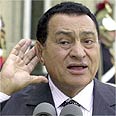
Egypt earned dubious respect this week when the Writers without Borders organization, which works for journalists rights, chose to add the nation to its blacklist of countries that oppresses free expression on the Internet. Thus, Egypt joined a list of 13 nations that regularly star on human rights reports: North Korea, China, Cuba, Iran, Syria, Saudi Arabia, Tunisia, Turkmenistan, Vietnam, Belarus, Uzbekistan and Myanmar.
While Egypt was being added to the list, its neighbor Libya was scratched off it, along with Nepal and the Maldives. “Egyptian President Hosni Mubarak, who has been in power since 1981, has exhibited worrying control in everything relating to the internet,” the organization wrote in its report. The group added that during this past year, the state imprisoned three civilians for writing in their blogs that they would like to see political reform in Egypt. Other bloggers were also harassed by the authorities for various reasons.
The organization harshly criticized the Egyptian court system, after it ruled that a website can be shut down if it threatens national security. “This is a worrying position, which could open the door to unbounded censorship on the Internet,” the group said.
And why was Libya taken off the blacklist? The organization explained that “following the organization’s mission (in Libya), it was found that the Libyan internet is no longer under surveillance,” and internet users who were arrested in the north African nation were freed. However, surfers should not yet take to the streets in celebration: “In spite of all this, leader Muammar al-Gaddafi is still considered as threat to free press.” Egypt, by the way, is ranked 133 and Libya is ranked 152 in the yearly free-press survey published in October.
Blogger arrested
In general, such information would disappear among other more noteworthy news stories in Egypt, but not these days. This week President Mubarak returned from a successful visit to Russian, China and Kazakhstan, where he spoke of his ambition to build power stations in Egypt. On the way back to Cairo he promised journalists that he would decentralize many of the authorities of his regime. However, an embarrassing incident took place on the day following the publication of the Internet blacklisting, which distracted Egyptians to no small degree.
The Reuters news agency reported that on Monday Egyptian security services arrest a 22-year-old student from Alexandria, Abed al-Qarim Suleiman, who kept an online blog in which he criticized the most prominent Islamic university, Alazhar, located in Cairo, and the Egyptian regime.
“The accusations against (Suleiman) charge that he expressed opinions that disturb public peace, insult the president and malign Islam,” Sali Sami said, a senior official in the Arab human rights organization which is legally representing the student. “It becomes more and more obvious that the government is not keen to make reforms leading to true democracy in which varied opinions can be heard.”
So what was the ado about? According to a senior member of the organizations, Jamal Ayid, Suleiman criticized Alazhar’s dominance over everything related to thinking on religious topics, and said the Islamic university’s religious leaders have part in the April attack in Alexandria in which Christian worshippers were stabbed.
Suleiman, who had been a second year student at al-Azhar was permanently suspended after he "expressed doubts regarding Islam and criticized a few of the religion's symobls," said his friends. This is not the first time the student was detained. On November 6, 2005, national security forces broke into Suleiman's house and arrested him, pursuant to statements he'd posted on a number of internet sites. During his investigation, Suliman admitted to writing the statements.
In the meantime, it seems that the student will remain in custody. Following a court hearing in Egypt, Suleiman's sentence was lengthened by two weeks, before a prosecutor asked him whether he had 'emotional problems'. Apparently sustpecting that this would happen, he had asked his lawyer for food, money and blankets for a prolonged jail sentence, prior to the hearing.
During these two additional weeks in prison, the prosecutor said that he will be reexamined, until "he returns to reason".
Suleiman's friends from the internet site refuse to back down from the issue. They have created a special site for "the global struggle for the release of Abed al-Qarim", which contains a video about him and the situation surrounding his arrest. "This campaign is our way of fighting for freedom of expression," they explained.
Additionally, his friends published an internet petition calling for his release. The authors of the petition intend to sent it to Egyptian Prime Minister Ahmed Nazif, Alexandria governor Adel Labib, US State Department's Assistant Secretary for Middle Eastern Affairs David Welch, the US ambassador to Egypt and other senior officials.
Granted, the affair is still unresolved, but it nonetheless strengthens Egypt's continuing post on the black list of countries that monitor internet surfing.















